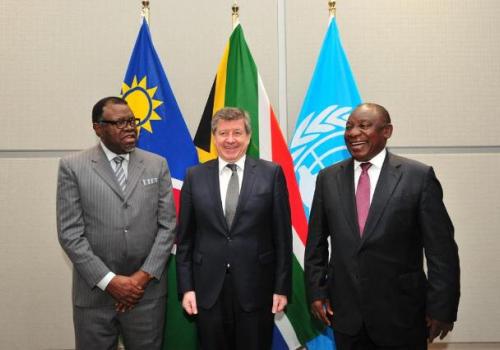His Excellency, Dr Hage Geingob, President of the Republic of Namibia and Chairperson of Southern African Development Community (SADC) has paid tribute to International Labour Organization (ILO) for remaining resolute in advancing the notion that people should be at the centre of real progress in the modern-day global society.
Speaking when he delivered remarks during the regional launch of the ILO Global Commission Report on the Future of Work on 1st March 2019, in Durban, South Africa, President Geingob, said that the SADC region identifies with ILO’s ideal and fully support the present report, which is anchored on the proposition of “a human-centred agenda for the future of work.
The ILO report contains recommendations that are founded on three pillars of; increasing investment in people’s capabilities; increasing investments in the institutions of work; and increasing investment in decent and sustainable work.
Commenting on the first pillar, President Dr Geingob, said the education curricula in the SADC region needs considerable reorientation to better respond to emerging and future labour market needs, to ensure that the labour market is stable as a source of income and livelihoods for majority of the people. He appealed for considerable investments to be made available to support education and skills development.
As for the second pillar of increasing investments in the institution of work, the SADC Chairperson observed that the report recognised that the workplace is mainly made up of workers and, therefore, bold measures are needed, including the establishment of a universal labour guarantee that includes the right to an adequate living wage and a safe working environment.
On the third pillar of increasing investment in decent and sustainable work, the SADC Chairperson said that investments are urgently required, given that despite the positive economic growth rates registered by SADC Member States over a long period of time, the effect on employment growth has been very minimal. Therefore, unemployment and underemployment in the region present formidable challenge for the Member States, especially youth unemployment.
For his part, His Excellency President of the Republic of South Africa, Cyril Ramaphosa acknowledged that many of the advances of the past two centuries in the world of work ranging from raised wage levels, improved working hours, unemployment insurance and other worker benefits have been possible because of the international labour standards and social protection set by the ILO.
President Ramaphosa also said in many societies, working people still labour in antiquated working conditions that have little regard to their rights, with forced indenture and even forms of servitude and bondage common. He said elsewhere, rapid technological advance has had its own consequences for workers and communities, with digitisation and mechanisation of work processes giving rise to increased insecurity and job losses.
Consequently, he said, the impacts of globalisation, demographic shifts, trade and other forms of protectionism, and climate change are bound to have dire consequences for future work processes. Therefore, it is how to manage and harness these forces currently transforming our world that has given impetus to the ILO Global Commission on the Future of Work.
The regional launch of the report was attended by some Ministers from the South African government, the ILO Director General, Mr. Guy Ryder, and the Chairperson of the African Regional Labour Administration Centre Governing Council, Dr Sekai Nzenza.

